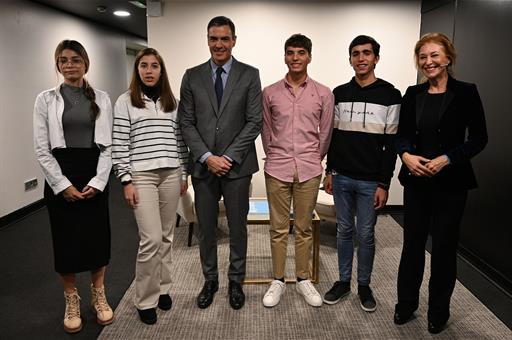Pedro Sánchez: "This government will continue to put children and adolescents at the centre of an ambitious transformative agenda"
President's News - 2022.11.22
Caixaforum Auditorium, Madrid
During the closing ceremony of the event 'Childhood and the future. Voices and views in times of crisis', organised by UNICEF on the occasion of yesterday's World Children's Day, Sánchez said that his government "will continue to place children and adolescents at the centre of an ambitious agenda for change" and that this commitment is reflected in the General State Budget for 2023, in five fundamental lines of action.
First, "a child support supplement in the Minimum Basic Income (IMV) to which we are allocating €3 billion". Second, "through parenting support, endowed with more than €3.7 billion". Third, with "an unprecedented allocation of more than €2.5 billion in scholarships and study grants, an essential factor for social mobility". Fourth, with "an investment effort of €136 million to strengthen the public education network from 0 to 3 years of age". And fifth, "with a budget increase of 6.7% in health and mental health care, one of the greatest concerns of children and adolescents, exacerbated by the impact of social networks and a bullying phenomena against which we have a duty to firmly speak out".
The chief executive likewise reviewed other public policies aimed at children implemented by the Government of Spain, such as the promotion of the Law for the Comprehensive Protection of Children and Adolescents against Violence, "a fundamental and pioneering advance in the defence of the rights of minors and in guaranteeing their dignity"; and the approval last week of the Strategy for the Eradication of Violence against Children and Adolescents, which he described as "a key coordination instrument for the development of the Law, with a detailed roadmap for the next seven years in this area".
Objective: 700,000 fewer children at risk of poverty and social exclusion
Similarly, he also referred to the European Child Guarantee National Action Plan, an initiative he had already presented in his first speech to the European Parliament more than three years ago as an example of a Europe that protects those who need it most". In this area, he recalled that the Ministry of Social Rights and 2030 Agenda, together with the High Commissioner against Child Poverty, have worked hand in hand with UNICEF to develop a programme endowed with almost €1 billion of investment to "prevent and combat the social exclusion of children through effective access to early childhood education and care, education and extracurricular activities, healthy nutrition, health services and adequate housing. With a clear and measurable objective: that by 2030, there will be 700,000 fewer children at risk of poverty and social exclusion in our country", he remarked.
"We have made remarkable advances, including drastically reducing the number of households with children with no income and substantially improving school drop-out rates, but there is still a long way to go," he insisted. He pointed out that "fighting this infamy from the public authorities is therefore a moral imperative that requires determination, resources and a sustained national effort".
During his speech, Pedro Sánchez recalled that almost 1 billion children suffer from multidimensional poverty in the world, of which more than 350 million live in extreme poverty, highlighting the solidarity work of UNICEF, an institution that is celebrating its 75th anniversary this year. On this point, he underlined that UNICEF Spain, with half a million members and donors, is one of the most important committees in the world, which shows that our country "is committed to causes of solidarity, as we have seen once again with the exemplary reception of thousands of refugees - many of them children - displaced from Ukraine because of the war".
Non official translation





